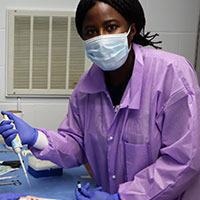According to a new study, treating wounds with an extract made from wild blueberries can help them recover faster. The findings will be presented at the American Physiological Society’s (APS) annual meeting, Experimental Biology 2022, in Philadelphia.
 Tolu Esther Adekeye, MS, University of Maine. Image Credit: Tolu Esther Adekeye.
Tolu Esther Adekeye, MS, University of Maine. Image Credit: Tolu Esther Adekeye.
Wound treatment costs more than $50 billion every year. Chronic wounds, including diabetes-related sores and pressure ulcers, might be classified as “nonhealing” due to the lack of vascularization (the formation of nutrient-rich blood vessels) that typically occurs. Wound healing requires vascularization.
Researchers from the University of Maine previously discovered that a phenolic extract from wild blueberries increased vascularization and cell migration in human umbilical cord cells, both of which are important phases in the healing process.
The effects of the phenolic extract on live wounds were investigated in a recent study headed by Dorothy Klimis-Zacas, MS, PhD, FACN. Phenols are antioxidant chemicals found naturally in some foods that help to prevent or reverse cell damage.
A topical gel comprising a wild blueberry phenolic extract was used to treat a group of rats. The treated group demonstrated enhanced migration of endothelial cells to the wound site and a 12% increase in wound closure when compared to animals treated with a base gel that did not include the phenolic extract and a control group that received no therapy.
Wild blueberries have the potential to enhance cell migration, new blood vessel formation (angiogenesis) and vascularization and to speed up wound closure. This is especially important in conditions that require enhanced wound closure in patients with chronic wounds such as diabetic wounds, burns, and pressure ulcers.”
Tolu Esther Adekeye, MS, Study First Author, University of Maine